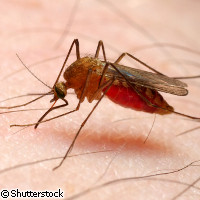Scientists find link between parasite and mosquito infection prevention
A group of scientists in the UK has discovered how infecting mosquitoes with a bacterial parasite could help prevent infections caused by these pesky insects. The results of the study, published in the journal Science, are part of the ANOPOPAGE ('Population age structure and age structure modification via Wolbachia in Anopheles gambiae') project, which received EUR 1 million under the 'Health' Theme of the EU's Seventh Framework Programme (FP7). Lymphatic filariasis (aka Elephantiasis), one of the most neglected tropical diseases impacting the developing world, puts over 1 billion people at risk. The World Health Organization (WHO) says that more than 120 million people are already suffering from this disease, and over 40 million of them are seriously incapacitated or disfigured. Lymphatic filariasis is triggered by infection with the parasitic filarial nematode (a threadlike unsegmented worm), spread by mosquitoes. Past studies have shown that a mosquito infected with a strain of the bacterial parasite Wolbachia, called 'wMelPop' or 'popcorn', can die a lot sooner than expected. The data have shown that because mosquito-borne parasites need an incubation period between ingestion and transmission, only older mosquitoes are able to cause infection. The scientists from the University of Oxford in the UK took the research a step further by investigating the genomes of genetically identical mosquitoes (some were infected with wMelPop). The team found that besides cutting the insects' lives in half and quashing their power to spread infection, wMelPop directly inhibits transmission of the filarial nematode by inducing the mosquito's immune system to attack the worm. Their work showed that fewer filarial nematodes developed in mosquitoes infected by wMelPop. 'Wolbachia infection appears to significantly increase the activity of around 200 mosquito genes, many of which are involved in the immune response,' explained Dr Steven Sinkins of the University of Oxford and a Wellcome Trust Senior Research Fellow. 'This then primes the mosquito's immune system to fight infection by the filarial nematodes, preventing the worm from developing to a stage where transmission to humans is possible.' Research has also shown that Wolbachia infections, including wMelPop, can safeguard people against certain viruses. For their part, the scientists said their work suggests that this effect could also be a result of the boost to the mosquito's immune system. The scientists are now investigating whether infecting other mosquito species such as Anopheles gambiae with wMelPop would have a similar result and help curb the transmission of malaria and filariasis. 'The Wolbachia "popcorn" strain is a naturally occurring organism found in a particular species of fruit fly which, if successfully introduced into mosquito populations, could potentially help us fight a number of the world's most serious diseases,' Dr Sinkins said. Around 500 million cases of malaria and 1 to 3 million deaths emerge each year. The major agents of this disease are the mosquitoes of the Anopheles gambiae complex. While insecticide-based control programmes targeting the agents have worked best to control the disease, their effectiveness has diminished due to increased insecticide resistance. The scientists speculate that wMelPop could be a valuable candidate in the global fight to keep mosquito-borne diseases at bay.



